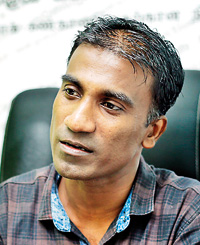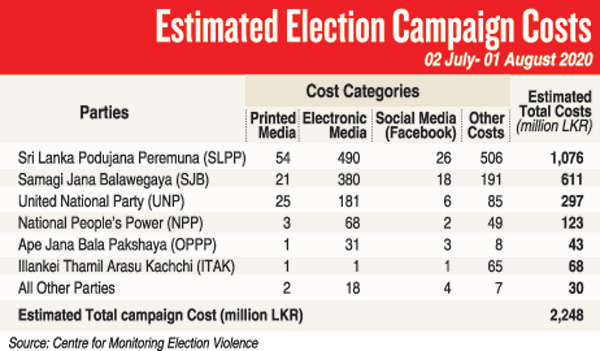News
Uneven playing field favours candidates with more money
The more than Rs. 2 billion candidates spent on their general elections campaign at the grassroots level and in the digital space point to an uneven playing field which favours candidates with more money, polls monitors say.

Manjula Gajanayake
They say the disparity in campaign spending called into question the fairness of the election process.
Manjula Gajanayake, National Coordinator of the Centre for Monitoring Election Violence (CMEV), told the Sunday Times that without campaign finance laws in place, a free and fair election could not be conducted in Sri Lanka. A glance at the list of elected candidates showed the more the candidates’ spent on their campaign the more their chances of being elected, he said.
The CMEV, which monitored the campaign finance, including what the candidates spent on social media platforms, has estimated that at least Rs 2,248 million was spent by political parties. Its study shows that Sri Lanka Podujana Peramuna (SLPP) candidates spent Rs 1,076 million while Samagi Jana Balawegaya (SJB) candidates spent Rs 611 million on their campaigns.
The People’s Action for Free and Fair Elections (PAFFREL), another election watchdog, says that through the March 12 Movement, a civil society-led initiative, it has been calling for effective campaign finance regulations to bring about a decent political culture in the country. Such regulations should make it mandatory for candidates to declare their assets and campaign finance details.
PAFFREL Executive Director Rohana Hettiarachchi told the Sunday Times that candidates’ financial power became a major factor in winning a seat in the August 5 general elections, with the Election Commission strictly implementing the election laws which barred traditional campaign activities such as printing banners and putting up posters.
“Those candidates with financial power had an extra mileage compared to other candidates as they were able to carry out aggressive campaigns on electronic and social media platforms,” Mr Hettiarachchi said, pointing out that the inequality in campaign spending had become a major phenomenon in the recent general elections campaign.
A leading private broadcasting institution became a platform for a group of new candidates from a political party. Most of them were elected. One of them told the Sunday Times on the condition of anonymity that his electronic media campaign package offered by the institution cost Rs 50 million and it included running his adverts during peak hours and in between popular teledramas, in addition to allocating time for him in news bulletins.
Former Parliamentarian Mylvaganam Thilakarajah decided not to contest the August 5 elections purely due to financial reasons since he could not raise the funds for campaign purposes. He was a member of the Tamil Progressive Alliance (TPA), a key alliance partner in the Samagi Jana Balawegaya (SJB). Instead, he claimed that he was assured of a national seat but that also did not materialise due to the same reason.
“I have made it clear in a public forum organised by the March 12 Movement that it was difficult for a politician to carry out an effective campaign without necessary funds. Unfortunately, I could not raise the required amount,” said Mr Thilakarajah, who, according to Manthri.lk, was the most active MP from the Nuwara Eliya District in the last parliament. The website maintains a scoreboard on MPs’ performance.
This week, Gampaha district SJB Parliamentarian Ranjan Ramanayake who has been re-elected, released his campaign expenditure details on his official Facebook account. He claims his campaign cost Rs 5.6 million and it was carried out without posters or setting up offices in the electorates. The biggest segment of his campaign expenditure was for electronic media ads. It cost him Rs 3.3 million. He has also got Rs. 500,000 from the SJB for his campaign expenses.
“I voluntarily released my campaign expenditure details in keeping up with ethics promoted by civil society organisations to create a better political culture in the country. Why can’t others follow suit and release their details of campaign expenditure?” Mr Ramanayake asked while claiming that most of those well-organised campaigns were funded by drug barons or some private companies to protect their vested interests.
This week, Malaka Silva, son of former Minister Mervyn Silva, was arrested by police over allegations that he threatened a Battaramulla businessman for failing to contribute funds to his father’s election campaign.
The businessman told the Thalangama police that Mr Silva demanded Rs 100,000 from him and he could not pay due to financial difficulties. Mr Silva was released on bail later by Kaduwela Magistrate courts.
In 2018, with inputs from election monitoring bodies, civil society organisations and media institutions, the Election Commission drafted a progressive bill titled “Regulation of Election Expenditure Act”. The draft bill devised a campaign finance ceiling for parties and independent groups, considering the number of registered voters in an electorate. The bill also proposed to impose a fine of Rs 100,000 on those who violate the regulations.
During a pre-polls interview with the Sunday Times early this month, Election Commission Chairman Mahinda Deshapriya said a draft bill regulating the campaign finance which was drafted by the Commission was approved by the previous government in 2017 but was not presented for approval by parliament.
“At present we don’t have any regulations in place with regard to campaign finance,” Mr. Deshapriya said, adding that the Commission was toothless without powers to take proactive steps.
Even though political parties and candidates spend millions for election campaign purposes, they do not declare annually their comprehensive account details of election expenditure to the Election Commission as required by the law, rather than mentioning a token amount being spent for such purposes, EC sources said.



